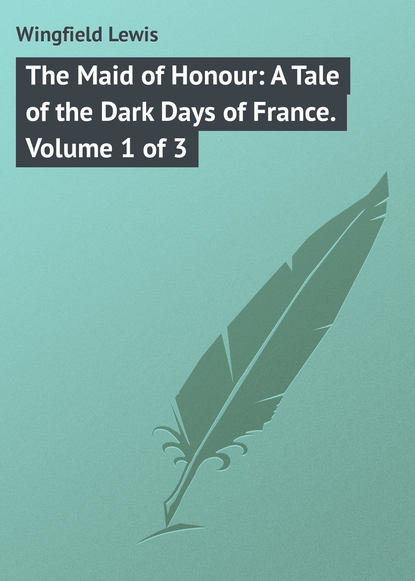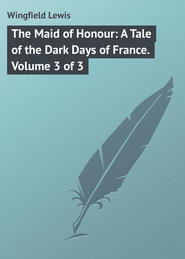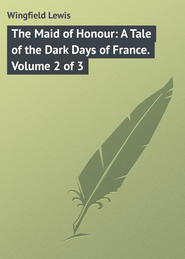По всем вопросам обращайтесь на: info@litportal.ru
(©) 2003-2024.
✖
The Maid of Honour: A Tale of the Dark Days of France. Volume 1 of 3
Настройки чтения
Размер шрифта
Высота строк
Поля
"Other inmates! What can you mean?'
"As you know, though you have never seen them, I have two half-brothers. They are inseparable-quite pattern brothers-the one brilliantly clever, the other his admiring shadow. The Abbé Pharamond, the younger one, would be welcomed in any society on account of his sparkling talent; but he has preferred to shine alone at Toulouse, rather than consent to be a unit in the system of stars at Paris. He has got into trouble, and writes to ask for an asylum for himself and Phebus."
"What trouble?"
"A too pungent epigram followed by a fatal duel, makes it convenient to seek eclipse. In six months the affair will have blown over. You would be sure to like the abbé, if you met him; while as for poor dear Phebus, the chevalier, as he is called in the south, he is fat and somnolent, and would not hurt a fly."
Gabrielle reflected, Why did a voice deep down within whisper words of warning? Here were the congenial persons for whose advent she had longed. What a relief to the tête-à-tête would be the brilliant abbé, and fat Phebus who would not hurt a fly! Thanks to them, Lorge might become endurable. On the suggestion of a return to Paris, the difficulty had occurred to her as to the excuse to be made for her husband's lengthened absence. Clearly she must remain at Lorge, so long as he thought fit to do so. Perhaps the abbé disliked music and hated violoncellos? Together in the dead of night they would capture the marquis's treasure and send it floating down the Loire.
"My dear Clovis!" she exclaimed presently, with genuine pleasure; "you singular being! What objection could I have? On the contrary, I am charmed with the opportunity of making the acquaintance of your brothers."
CHAPTER V.
THE HALF-BROTHERS
Never was there a greater bit of luck for the Lorge hermits than the epigram that was too pungent, and its consequences. With the arrival of the fugitives there was inaugurated a new régime. Cobwebs seemed to vanish at a stroke. The dismal old chateau stirred and rubbed its eyes, for, as by magic, the spirit of ennui who had his dwelling there was routed and put to flight.
The Abbé Pharamond was made of quicksilver. Such a mass of ubiquitous ever-moving energy would have awakened the seven sleepers. Everyone felt his influence; and no one had a word to say against him, except Toinon and Jean Boulot. Even the objections of these, as might be expected in low-born persons, were of the vaguest. The one found fault with his effeminate manners and mincing ways, the other vowed that he was so sweet as to be mawkish. Balanced one on either knee, the prodigies (with clean pinafores and polished visages) were taught to warble the amorous ditties of the south, an absurd performance which frequently brought over Madame de Vaux in the shanderydan, and caused her to explode with laughter. His presence acted like a magnet. There was always a stock of the neatest compliments on hand for Angelique; the most respectfully rapt attention for the baron's platitudes. He was constantly riding to Montbazon on his way to somewhere else, bent on organizing a picnic or a hunt, and even discovered and dragged from their retreats into the light a variety of country gentlemen who seldom left their burrows. "If the dear man were a layman!" grieved the baroness. "The very thing for Angelique." But since he was a churchman, she must do her best with the other.
"Pooh! Stuff and nonsense!" objected the baron. "They were of good family-could boast, indeed, of most superior blood-but were as poor as church mice, both."
Whereupon his spouse remarked from out her nightcap folds that she did dislike a mole. Was not the marquis a good-natured gentleman, if stupid, and was he not plainly devoted to his brothers-proud at least of one? It could be seen with half an eye that the abbé's influence was great, and would grow greater. Out of Gabrielle's wealth, after de Brèze's death, he would, of course, provide for his brothers in a fitting and lavish manner.
Gabrielle fell at once, and without resistance, under the spell of the abbé. She had never known so charming and accomplished a person. Faugh! the tawdry butterflies of Versailles! The gaudy numskulls! Mere contemptible machines, that mopped and mowed to order. In Pharamond she beheld for the first time a man whose masterful nature somehow compelled obedience. Among other fascinating ways, he had a trick (aware of a trim and graceful figure) of tossing himself down in a picturesque attitude at Gabrielle's feet, burningly eager for advice; and on considering the interview afterwards, she was pleasantly surprised to find how she had shone-how undoubtedly, yet unaccountably, sage had been her counsel. "He exerts a good influence over me," she murmured. "Like flowers under the sun's first rays I expand. Till he arrived, I knew not how dense had been our darkness. Alas! if Clovis were a little like him how different had been my fate!"
Even Clovis was the better for the abbé's advent. His brother would walk straight into his sanctum and drag him from his books to join some party of pleasure; but, lest he should turn restive, would argue in his nimble fashion, as they rode along, upon abstruse points of philosophy. Though not fully believing in the tremendous powers claimed by the prophet, he declared himself open to conviction with regard to Mesmer; and Gabrielle was amazed to perceive how animated her husband could become in his efforts to convince the doubter. When hounded from the capital, Mesmer had travelled south before settling at Spa, and the abbé had seen him perform his marvels. Hunted out of Paris by the Academy of Medicine, persecution had produced the usual result-attacked, defended, abused, glorified, Fame shook all her bauble bells, and rescued his name from neglect. At Montpelier, his following was so great that he and his small staff could not supply the necessary treatment. There was no denying that under his magnetic passes certain patients did recover. However much argument might meander, it always came back to that point. In what the mysterious healing fluid consisted, was the difficult question. Did an invisible current actually flow from the manipulator to the patient, or was it but the effect of ascendency of will-of the strong nature bearing down the weak?
During the discussions on the subject, the abbé would jokingly wave his whip at the chevalier, whose sleek figure jogged behind. "There is a case in point," he laughed. "Phebus's will is completely subservient to mine, and he knows it. Tell them, chevalier, is there anything I could not make you do?"
Then the broad visage of Phebus would beam with respectful pride as he surveyed his clever brother. "No, abbé," he would quietly rejoin. "You are wiser and better than I, and I am content that you should think for both."
Then in his turn would Clovis laugh as he glanced at the attentive Gabrielle. "We must be careful, lest," he observed, slyly, "we forfeit our independence. While pretending to disbelieve, he is deceiving us, for he is himself gifted with magnetic powers of a high order. I vow I am half influenced already, and must take precautions lest I become a slave."
Those were pleasant rides under the yellowing foliage in the late autumn of '89. Clovis was galvanised into a semblance of activity, and appeared under the process to have half realized how charming was his wife. Instead of provokingly staring without seeing her, he observed how fresh was her complexion, how silken and golden and heavy were the loose plaits of her unpowdered hair. To her astonishment, following the abbé's lead, he became almost attentive, guiding her horse over difficult ground, even marking the fact when she was tired.
And so it came about, as by touch of fairy wand, that Gabrielle, alone in the desert, had found a following. The husband whom she adored was displaying a ghostly kindness, with which for the present she was content. If he only would appreciate the prodigies-but that, under beneficent influence, would follow, doubtless. The newly-arrived swains vied with each other in endeavouring to forestall her wishes. The abbé ordered everyone about for the general good and her particular behoof, like some hovering farseeing deity; while the less pretentious chevalier plodded at her heel like a wheezy spaniel, as active as his redundancy permitted.
In their way, good looking fellows both. The chevalier was short and very fair, with pale blue eyes and a weak mouth, producing a somewhat washed-out effect. His nose was aquiline and delicately moulded. In many respects he bore a curious resemblance to his majesty the reigning monarch. The abbé, his junior by several years, looked a decade younger at least. He was slim and wiry, built on a small scale, with well-turned limbs and white hands remarkable for their fragility. Indeed, in considering his appearance people always remembered the soft, twining fingers which looked as weak as a woman's, and which, in a hand-shake, could give so firm a grip. His face was round and pale, his lips thin and tightly pressed together, his eyes steel-grey with a strongly accentuated pupil. There was something about his usual expression that suggested a particularly high-bred white cat-due possibly to a purring manner and an air of sensual complacency. But there were moments-not unknown to the chevalier-when the eyes could gleam with tawny lightning, darken with thunder-clouds, while the small even teeth were ground in passion, and the pale face turned livid. Like all seemingly light and effeminate beings, who are really of wrought steel, the gay and frolicsome abbé could become a sweeping whirlwind; but since he usually managed to have his way unchallenged, serious atmospheric disturbances were of rare occurrence. As the eyes of an angry cat seem to be illumined from behind, so on rare occasions of excessive wrath those of the abbé assumed a malevolent glitter, in face of which the chevalier cowered, despite his breadth of beam. His plump uncertain hands grew moist, his words were few and husky; he whimpered and breathed hard; and the privileged observer could have little doubt that there was absolutely nothing he could not be goaded to essay under pressure from Abbé Pharamond.
On a certain mild evening in October, master and serf were riding home from Montbazon, and the latter unconsciously shrank and stopped his horse, conscious of the glitter that he feared. Wistfully and humbly he looked up, anxious to ascertain wherein he had offended.
"The de Vaux are a charming family," remarked the abbé, airily kissing his fingertips. "I compliment you, dear brother."
When the abbé chose to gibe, the chevalier sniffed something disagreeable.
"Ha, ha! How lugubrious a countenance for a favoured lover! As doleful as a bee who's lost his sting! When do we propose to marry? Never keep a lady waiting!"
"What do you mean?" stammered Phebus, mopping his brow.
"Madame de Vaux expects you to propose for Angelique."
"But I don't want to marry Angelique."
"What! Not the delightful shoot from the family tree of which we hear so much? Like the Indian banyan its proportions darken the sky. Why not-tell me?"
"Because I do not wish to marry at all," replied Phebus.
"And why-and why-and why?" laughed Pharamond, in elfish mood. "Nay, do not tell me. Cannot I read into your erring soul as through a sheet of dirty glass? Because you are hopelessly enamoured of your brother's handsome wife!"
Phebus started and turned scarlet.
"Don't look so exasperatingly sheepish! you quivering mass of jelly," sneered Pharamond.
An explosion of laughter resounded through the wood and ceased, and the glitter shone forth again.
"Do you know that it is extremely wrong to nourish a flame for one's brother's wife?" he inquired dryly. "Most reprehensible in itself and not unlikely to lead to complications. Will Clovis approve, think you?"
Perceiving that Phebus was too confused and upset by the sudden attack to answer, the abbé frisked on, urging forward both horses with his whip.
"See!" he observed, addressing nature generally. "How lenient Mother Church can be to the shortcomings of the weak! Do I blame this culprit for adoring the lovely Gabrielle? Not a bit! If he did not his heart would be of stone instead of pulp. Stout Phebus is consumed with hopeless adoration. But is it hopeless? Ah! There's the rub. Don't babble like an idiot, but confess. Have we openly given vent to our boiling passion? Yes, or no?"
The chevalier bent his head and sobbed out, "I'm a miserable wicked wretch!"
"Of course you are," affably agreed the abbé. "Make a clean breast of it to Mother Church, who will straightway absolve the sinner. Do we adore her to the ends of our fat fingers? Eh?"
"How can I help adoring her?" replied harassed Phebus.
"Certainly not-how could you?" echoed his tormentor. "Ho! ho! ho! ho!" The abbé's mocking laugh reverberated among the trees. "I've half a mind to tell Clovis-shall I? How he'd enjoy the jest!" And at contemplation of the maze of mischief that might result from such a proceeding, he laughed again, "Ho! ho!"
"Does she return your love? Have you really made the trial?" he inquired suddenly, with a sneer upon his lips. "No? Then, my poor fellow, I am genuinely sorry for your plight. Presto! The Church has run away! Behold a doctor; hearken to words of wisdom. Your ailment's very bad, but curable. This is a queer world, I'd have you know, in which there is one unpardonable crime, failure. We hunt down and exterminate the exposed bungler, who, if he bungles, and would yet save his skin, must take precautions not to be found out. Now I found you out at once, you simple oaf, so you deserve to be delivered to Clovis. I ought to sacrifice so paltry a specimen of intrigue, but then-are you not, too, my brother?"
The chevalier knitted his brows in a vain effort to comprehend what underlay the abbé's banter.
"Oh! what a tender brother!" the latter continued; "for I will even assist you in your quest. Yes, I, the virtuous Abbé Pharamond. The doctor prescribes a fervent wooing-a scaling of the ramparts-a storming of the citadel. You have gone too timidly to work. Between this husband and wife there can be no bond of union. That much we know. Ergo, the heart of the beauty is yet to win, since she is fancy free. You shall try your luck in earnest, and I will give you all my help-on one condition."
"You will!" murmured Phebus, melted to tears by admiring gratitude, "How shall I repay such kindness?"
"Thus. You try your hand and do your best, but if you fail you retire for ever from the field. If she likes you, well and good. Win and wear her and be happy. If not, promise to worry her no more with annoying importunities."
The suggested arrangement was so singular, that the chevalier, recovering himself a little, knew not what to think. What could his astute brother be driving at? Why should he desire to throw the hitherto unstained wife into a lover's arms? Had he a spite against the marquis? No. Against Gabrielle? Hardly. Perhaps he was sorry, as Phebus had been, to observe Clovis's neglect, and anxious to see Ariadne consoled? How kind of the abbé to select him, the chevalier, as the proposed comforter! A new vista of possibilities unrolled itself. Unaided he would have gone on sympathetically sighing, but with the abbé's encouragement and active assistance, wonders might be accomplished.
The latter was beaming on him now with bonhomie. Clearly he wished, fraternally, to see sister-in-law and brother happy, and imbued with the spirit of the times in which they lived, was doing his best to make them so. Warmly the chevalier blurted out his thanks. His brother was good and kind, as he always meant to be, though now and then so puzzling and strange. He would follow his instructions dutifully to the letter, and Gabrielle won, would be till death her slave.
"That is well," assented the abbé with a friendly clap on the shoulder. "You have beaten about the bush too long, instead of making straight for the goal. Women have sharp instincts, and since they require wooing, despise too bashful swains. This very night the coast shall be kept clear for you. The balmy autumn breeze is to love vows the softest of accompaniments. I will retain Clovis in his study with arguments about the prophet he reveres."
The two jogged on in amicable silence, both equally satisfied, to all appearances, with the result of the conference, until the peaked turrets of Lorge frowned black against a primrose sunset. Then, before entering the courtyard, the abbé turned and whispered sternly, "A compact, mind, which you will break at your peril. Win or withdraw. Do not attempt to deceive me, for I never forgive deceit."
CHAPTER VI.










